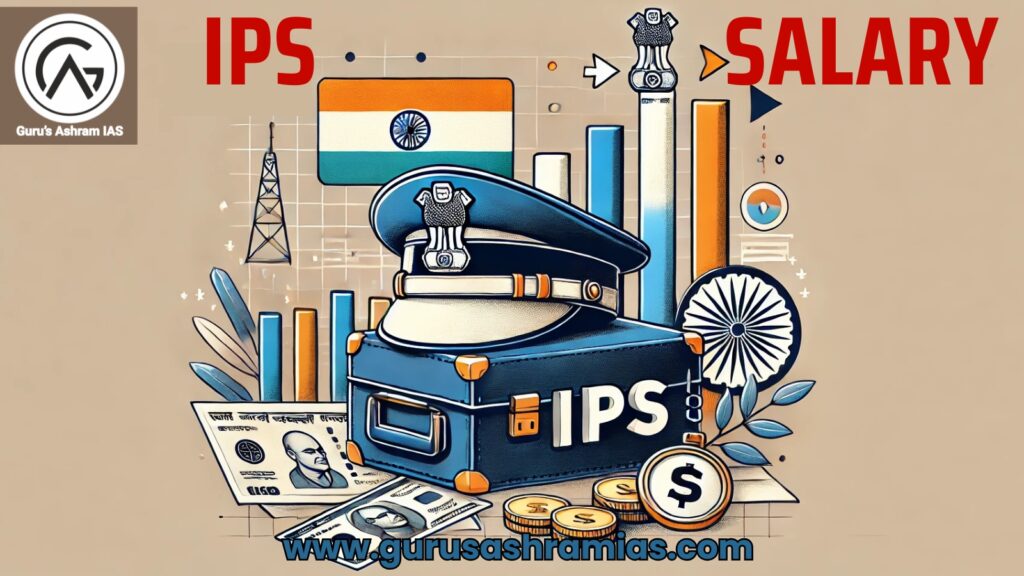IPS Salary Structure in India: A Comprehensive Guide
The Indian Police Service (IPS) is among the most prestigious positions in the country, offering a mix of respect, responsibility, and financial benefits. Alongside the honor of serving the nation, IPS officers enjoy a well-structured salary and numerous perks under the 7th Pay Commission. This article delves deep into the IPS salary structure, rank-based pay, allowances, and additional benefits to help aspirants and readers understand this rewarding career.
Full Form of DGP, DSP, SP, ASP, ACP?
The term DGP, DSP, SP, ASP, ACP are related to the police force. The full form of these terms are:
- DGP – Director General of Police
- DSP – Deputy Superintendent of Police
- SP – Superintendent of Police
- ASP – Assistant Superintendent of Police
- ACP – Assistant Commissioner of Police
Let us now study in-depth about the full forms mentioned above. The role of the police is numerous and each police has its own roles and duties.
IPS Officer Salary: An Expert Overview
Recruitment to the Indian Police Service (IPS) is considered one of the finest uniforms services in India and encompass significant prominence due to its distinctiveness as. IPS officers play a central role of keeping law and order in the society, eliminating crime, and heading specialized organizations. Though passion and commitment to work can be cited as the most influential factors the structured remuneration and career ladder are other motivating factors to the aspirants.
Explore the Salary of DGP (Director General of Police) salary per month, DSP – Deputy Superintendent of Police Salary, SP (Superintendent of Police) salary per month, ASP – Assistant Superintendent of Police Salary, ACP – Assistant Commissioner of Police Salary, IPS (Indian Police Service) salary after 10 years.
The IPS inside and outside Recruitment Pay Scale per Month
Basic Pay:
- A Deputy Commissioner of Police or ACP – Junior Scale officer will be paid initially at fresh entry level a basic pay of INR 56,000/- only.
- This goes up more so once one is promoted to senior ranks.
Grade Pay:
- Grade Pay as also known is an extra component of an IPS officer’s pay structure that differs on the rank and service period.
- It is included in the pattern of remuneration and is taken as a record of an officer’s promotion.
7th Central Pay Commission (CPC):
- The current 7th CPC also brought to change Pay Matrix for the first time replacing the earlier grade pay system.
- The Pay Matrix also comprises of pay levels and pay bands that awards payment according to rank and service year.
Experience Advance & Remuneration Increase
- Junior Scale (Entry-level): INR 56,100 per month.
- Senior Scale: Higher with extra working responsibilities and service years.
- DIG (Deputy Inspector General): About INR One Lakh Thirty One Thousand One Hundred only per month.
- Director General of Police (DGP): Greatest level in terms of remuneration of INR 2,25,000 per month.
There is also provision of annual increase in pay, and promotion on the basis of performance, or periodically pay restructuring for the IPS officers.
Incentives Beyond Salary
In addition to the monthly pay, IPS officers enjoy a range of benefits:
- Allowances: DA is Dearness Allowance, HRA is House Rent Allowance, and TA is the Travel Allowance.
- Perks: State cars, living accommodation, health care and personal employees assistance.
- Retirement Benefits: Pension, gratuity & provident fund contributions mean long term financial security.
Understanding the IPS Salary Structure
IPS salaries are structured according to ranks and are based on the 7th Pay Commission. The pay scale includes a Basic Pay, Grade Pay, and several allowances like House Rent Allowance (HRA), Dearness Allowance (DA), and Travel Allowance (TA). The monthly salary increases as officers are promoted through various ranks.
IPS Salary Table: Pay by Rank
Below is the detailed salary structure of IPS officers across various ranks:
Rank |
Pay Scale (INR) |
Basic Pay (INR) |
|---|---|---|
| Director General of Police (DGP) | 2,25,000 | 2,25,000 |
| Additional DGP | 2,05,400 | 2,05,400 |
| Inspector General (IG) | 1,44,200 | 1,44,200 |
| Deputy Inspector General (DIG) | 1,31,100 | 1,31,100 |
| Superintendent of Police (SP) | 78,800 | 78,800 |
| Deputy Superintendent of Police (DSP) | 56,100 | 56,100 |
Note: These figures are approximate and may vary slightly depending on factors such as location and additional roles.
Components of IPS Salary
- Basic Pay: This is the fixed salary component based on the rank.
- Dearness Allowance (DA): Adjusted for inflation, this is a percentage of the basic pay.
- House Rent Allowance (HRA): Varies depending on the city of posting (24%, 16%, or 8% of basic pay).
- Travel Allowance (TA): Reimbursement for official travel expenses.
- Special Allowances: For specific roles or challenging postings.
Perks and Benefits of IPS Officers
In addition to the financial considerations, IPS officers are in a position to claim to many privileges that would immediately facilitate the comfort and effectiveness of their work as well as making them highly sated. Let’s explore these in detail:
1. Residential Quarters
- IPS officers are given decent government houses usually in the posh localities and for their family and lifestyle needs.
2. Official Vehicle
- Each officer has an official car with his driver as well as personal car, thereby avoiding tiring before reaching a destination or being overly tired when getting to a destination.
3. Medical Facilities
- Officials under the CGHS, receive health care benefits for themselves and their dependents at very subsidized rates.
4. Leave and Retirement Benefits
- IPA employees receive leave encashment, gratuity and pension scheme; this assures the civil servant of financial security upon retirement.
5. Personal Support Staff
- Officers are entitled to be provided personal assistant, security personnel depending on the rank of the officer in question.
6. Job Security and Prestige
- The IPS provides unmatched employment security, social recognition and the ability to help in shaping safety and governance.
Detailed Rank Overview of IPS Officers
1. Deputy Superintendent of Police (DSP)
- Basic Pay: ₹56,100
- Role: Entry-level rank managing law and order, investigations, and maintaining public peace.
2. Superintendent of Police (SP)
- Basic Pay: ₹78,800
- Role: Oversees law enforcement within a district and coordinates with senior officers.
3. Deputy Inspector General (DIG)
- Basic Pay: ₹1,31,100
- Role: Supervises multiple districts and ensures adherence to laws and policies.
4. Inspector General of Police (IG)
- Basic Pay: ₹1,44,200
- Role: Commands a range of police forces within a zone or department.
5. Additional DGP
- Basic Pay: ₹2,05,400
- Role: Handles specialized roles such as intelligence or crime prevention.
6. Director General of Police (DGP)
- Basic Pay: ₹2,25,000
- Role: The highest-ranking officer responsible for overseeing state or central police forces.
How IPS Salary Compares to IAS Salary
IAS officers get slightly better allowances and perks because of their largegeh oeriatricon than that of other IPS officers civil servants they are well paid but the level of payment is different depending on the level of responsibilities assigned to the particular officer. The gross salary at entry level for both services is almost similar, though the career progression differs considerably.
IPS Salary in Different States
Even on the remuneration front there is parity across India but some states offer IPS inducements to undertake difficult assignments or supplement bonuses for exceptionally good results.
Common FAQs on IPS Salary
1. Is the IPS salary enough to sustain a luxurious lifestyle?
- Yes, the salary, combined with the perks, allows officers to maintain a comfortable and respectable standard of living.
2. Does the IPS salary increase with promotions?
- Yes, promotions bring significant increments in the basic pay and allowances.
3. Are there bonuses for IPS officers?
- While there are no direct bonuses, special allowances and rewards are given for exceptional service.
4. Can an IPS officer earn through other sources?
- No, IPS officers are bound by service rules and cannot engage in private employment or other income-generating activities.
Why Choose a Career in IPS?
The salary structure in IPS is not only recognition of organisational stability but also of the turmoil and responsibilities given to the officers. Apart from the financial rewards, the IPS provides unique prospects of uplifting the nation with honesty, professionalism and direction.
While the monetary benefits are significant, the IPS offers much more:
- Service to the Nation: IPS officers play a crucial role in maintaining law and order.
- Dynamic Work Environment: From fieldwork to administrative roles, the job is varied and challenging.
- Prestige and Influence: IPS officers command immense respect and influence within the system.
Conclusion
Not only does the IPS offer one of the best paying salaries in the country but also there are simply established many perks and benefits, making the job one of the most desired in India. In addition to the financial benefits the IPS provides the prospect of serving the nation with pride and honor. Regardless of whether the motivation is financial or social, the IPS, truly offers job satisfaction.




